ISTANBUL (AP) — Turkey and Israel have held “technical talks” aimed at preventing conflict between their troops in Syria, a Turkish official said Thursday.
The first discussions were held in Azerbaijan on Wednesday to establish a “de-escalation mechanism to prevent undesirable incidents in Syria,” the Defense Ministry official said on condition of anonymity as part of a policy to discuss the issue. “Work will continue to establish the conflict-free mechanism.”
Since the fall of President Bashar Assad in Syria late last year, Israel and Turkey have been competing over their separate interests there. Syria’s Foreign Ministry has said Israeli jets have struck a Syrian airbase. Turkey purportedly hopes to use the base to extend its influence.
Israel also fears that Syria’s new Islamist leadership will pose a new threat along its border and has set up a buffer zone inside Syrian territory. Turkey’s emergence as a key player in Syria, meanwhile, has prompted Israeli concerns over a larger Turkish military presence. Israel’s Prime Minister Benjamin Netanyahu said Tuesday that Turkish bases in Syria would be a “danger to Israel.”
Ankara is supporting the new Syrian government, which is led by former rebels it backed during the 13-year civil war. The support includes counterterrorism operations against the Islamic State group.
The Defense Ministry official said that assessments for the establishment of a base for joint Turkish-Syrian training are ongoing, adding that such activities followed international law “without targeting third countries.”
Netanyahu’s office confirmed Wednesday's negotiations and said both sides “agreed to continue on the path of dialogue in order to preserve security stability.”
Turkish Foreign Minister Hakan Fidan said Wednesday that Turkey had “no intention of conflict in Syria, not only with Israel but with any country in the region." But he added that Ankara "cannot watch Syria being subjected to an internal turmoil, an operation, a provocation that will threaten Turkey’s national security.”
Once strong regional partners, ties between Israel and Turkey have long been frosty and deteriorated further over the Israel-Hamas war in Gaza. Turkish President Recep Tayyip Erdogan has been an outspoken critic of the war, prompting angry reactions from Israeli officials.
Netanyahu this week sought to hear support from his ally President Donald Trump on a country Israel perceives as increasingly hostile. Instead, Trump lavished praise on Erdogan for “taking over Syria,” positioned himself as a possible mediator between the countries and urged Netanyahu to be “reasonable” in his dealings with Turkey.
———
Associated Press writer Melanie Lidman contributed from Tel Aviv, Israel.

Confetti and flowers are dropped from a military helicopter onto a crowd during a celebration marking the 10th anniversary of the victory of rebel forces over Bashar al-Assad's army in Idlib, Syria, Friday, March 28, 2025. (AP Photo/Ghaith Alsayed)
A federal judge on Thursday barred the Trump administration from deporting any Venezuelans from South Texas under an 18th-century wartime law and said President Donald Trump's invocation of it was “unlawful.”
U.S. District Court Judge Fernando Rodriguez Jr. is the first judge to rule that the Alien Enemies Act cannot be used against people who, the Republican administration claims, are gang members invading the United States. Rodriguez said he wouldn't interfere with the government's right to deport people in the country illegally through other means, but it could not rely on the 227-year-old law to do so.
“Neither the Court nor the parties question that the Executive Branch can direct the detention and removal of aliens who engage in criminal activity in the United States,” wrote Rodriguez, who was nominated by Trump in 2018. But, the judge said, "the President’s invocation of the AEA through the Proclamation exceeds the scope of the statute and is contrary to the plain, ordinary meaning of the statute’s terms.”
In March, Trump issued a proclamation claiming that the Venezuelan gang Tren de Aragua was invading the U.S. He said he had special powers to deport immigrants, identified by his administration as gang members, without the usual court proceedings.
"The Court concludes that the President’s invocation of the AEA through the Proclamation exceeds the scope of the statute and, as a result, is unlawful,” Rodriguez wrote.
The Trump administration slammed the ruling.
“The Trump administration is committed to unapologetically using every lever of power endowed to the executive branch by the Constitution and Congress to deliver on this mandate, and we are confident that we will ultimately prevail for the American people.,” White House spokesman Kush Desai said in a statement.
The chair of the Congressional Hispanic Caucus, Rep. Adriano Espaillat, D-N.Y., said in a statement the judge had made clear “what we all knew to be true: The Trump administration illegally used the Alien Enemies Act to deport people without due process.”
The Alien Enemies Act has only been used three times before in U.S. history, most recently during World War II, when it was cited to intern Japanese-Americans.
The proclamation triggered a flurry of litigation as the administration tried to ship migrants it claimed were gang members to a notorious prison in El Salvador.
Rodriguez’s ruling is significant because it is the first formal permanent injunction against the administration using the AEA and contends the president is misusing the law. "Congress never meant for this law to be used in this manner,” said Lee Gelernt, the ACLU lawyer who argued the case, in response to the ruling.
Rodriguez agreed, noting that the provision has only been used during the two World Wars and the War of 1812. Trump claimed Tren de Aragua was acting at the behest of the Venezuelan government, but Rodriguez found that the activities the administration accused it of did not amount to an invasion or “predatory incursion,” as the statute requires.
“The Proclamation makes no reference to and in no manner suggests that a threat exists of an organized, armed group of individuals entering the United States at the direction of Venezuela to conquer the country or assume control over a portion of the nation,” Rodriguez wrote. “Thus, the Proclamation’s language cannot be read as describing conduct that falls within the meaning of ‘invasion’ for purposes of the AEA.”
If the administration appeals, it would go first to the New Orleans-based 5th U.S. Circuit Court of Appeals. That is among the nation’s most conservative appeals courts and it also has ruled against what it saw as overreach on immigration matters by both the Obama and Biden administrations. In those cases, Democratic administrations had sought to make it easier for immigrants to remain in the U.S.
The administration, as it has in other cases challenging its expansive view of presidential power, could turn to appellate courts, including the U.S. Supreme Court, in the form of an emergency motion for a stay pending an appeal.
The Supreme Court already has weighed in once on the issue of deportations under the AEA. The justices held that migrants alleged to be gang members must be given “reasonable time” to contest their removal from the country. The court has not specified the length of time.
It’s possible that the losing side in the 5th Circuit would file an emergency appeal with the justices that also would ask them to short-circuit lower court action in favor of a definitive ruling from the nation’s highest court. Such a decision likely would be months away, at least.
The Texas case is just one piece of a tangle of litigation sparked by Trump's proclamation.
The ACLU initially filed suit in the nation's capital to block deportations. U.S. District Judge James E. Boasberg issued a temporary hold on removals and ordered the administration turn around planes that had left with detainees headed to El Salvador, a directive that was apparently ignored. Later, the Supreme Court weighed in.
The justices stepped in again late last month with an unusual postmidnight order halting deportations from North Texas, where the ACLU contended the administration was preparing for another round of flights to El Salvador.
Riccardi reported from Denver. Associated Press writers Lindsay Whitehurst and Mark Sherman contributed to this report.
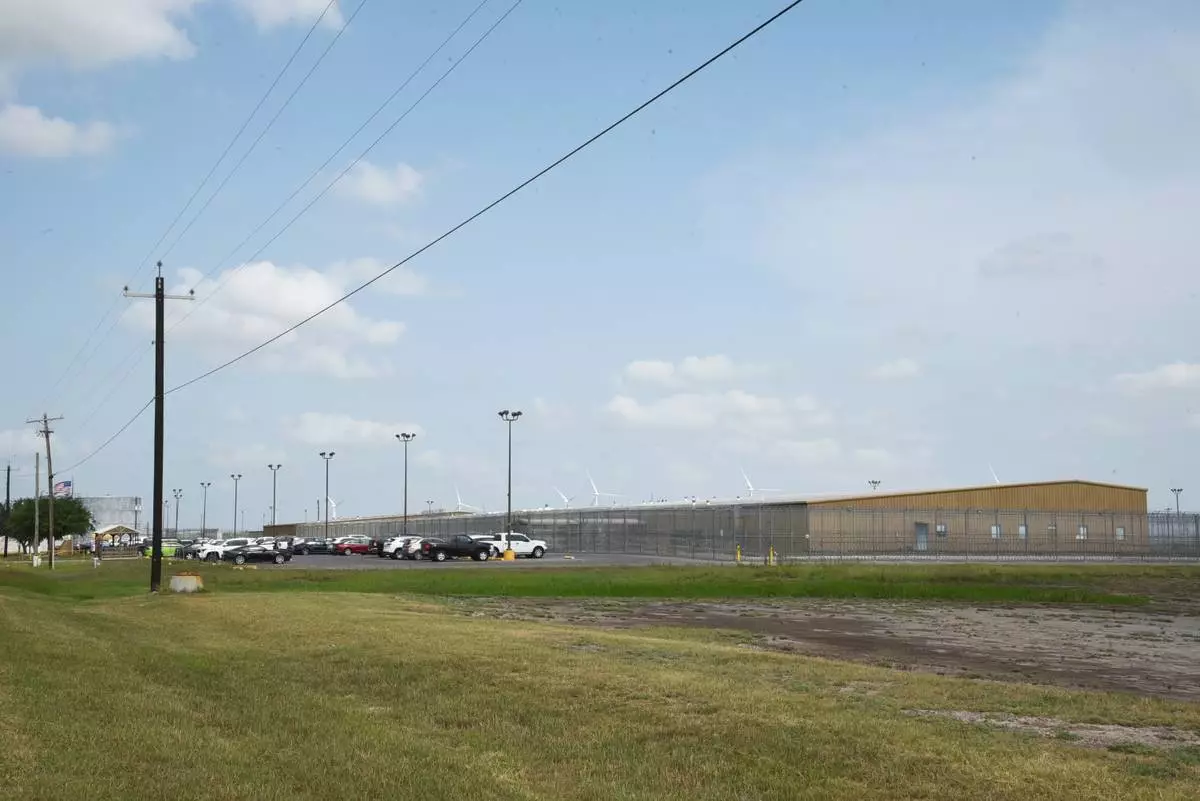
The El Valle Detention Center in Raymondville, Texas is pictured, Thursday, May 1, 2025, after a federal judge in the district barred the Trump administration from deporting any Venezuelans at the south Texas detention center under the Alien Enemies Act, an 18th-century wartime law. (AP Photo/Valerie Gonzalez)
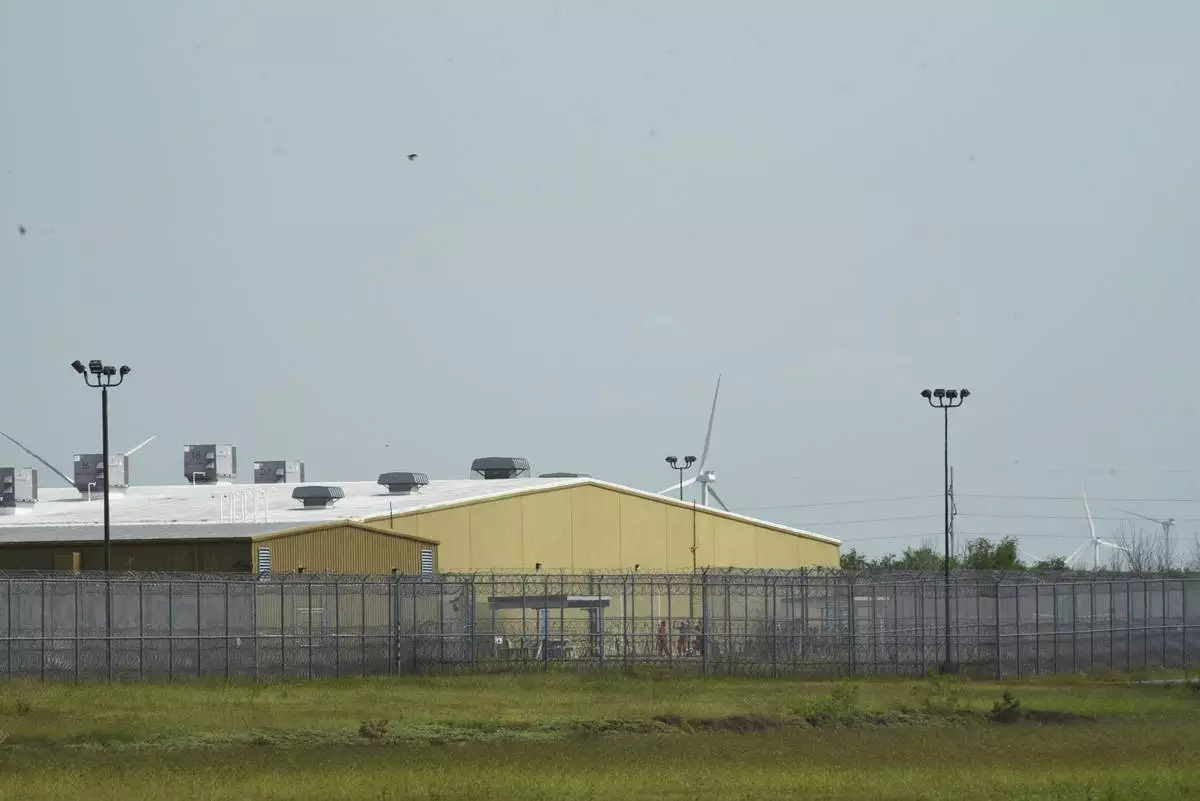
Detainees held at El Valle Detention Center in Raymondville, Texas are seen outside briefly, Thursday, May 1, 2025, after a federal judge in the district barred the Trump administration from deporting any Venezuelans from South Texas under the Alien Enemies Act, an 18th-century wartime law. (AP Photo/Valerie Gonzalez)
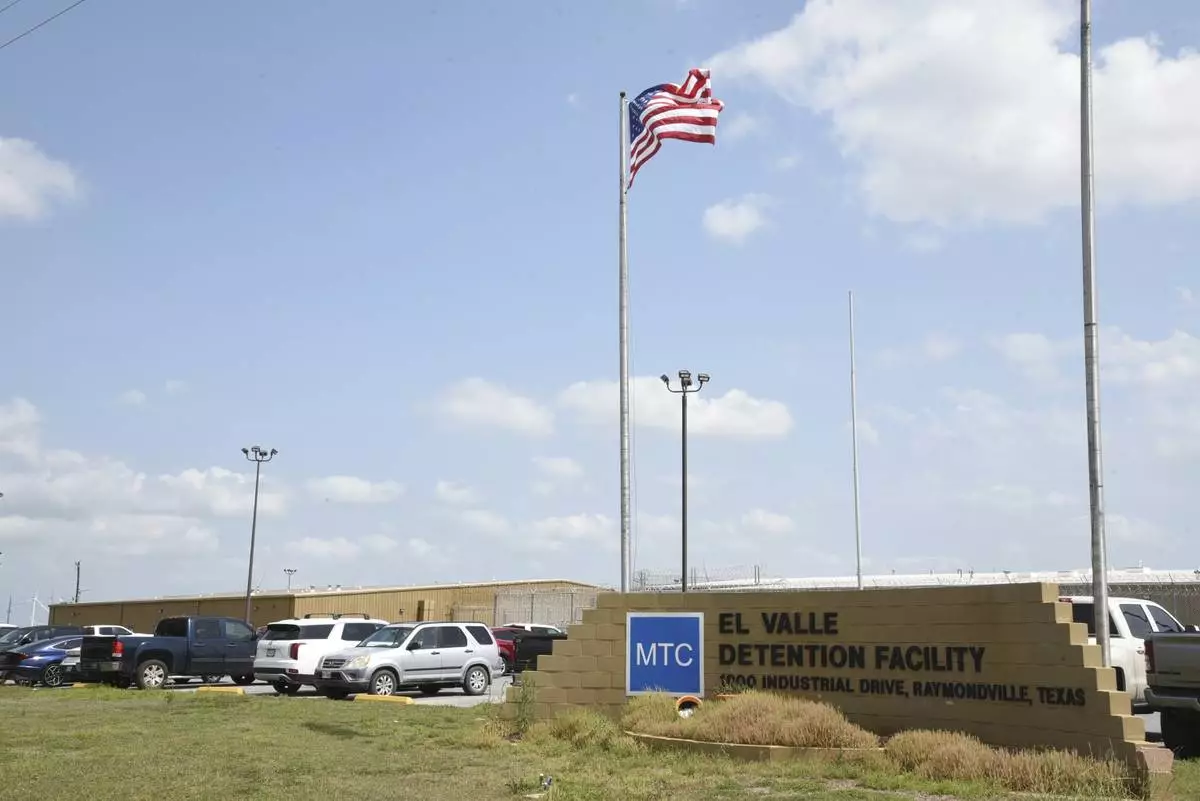
The El Valle Detention Center in Raymondville, Texas is pictured, Thursday, May 1, 2025, after a federal judge in the district barred the Trump administration from deporting any Venezuelans at the south Texas detention center under the Alien Enemies Act, an 18th-century wartime law. (AP Photo/Valerie Gonzalez)
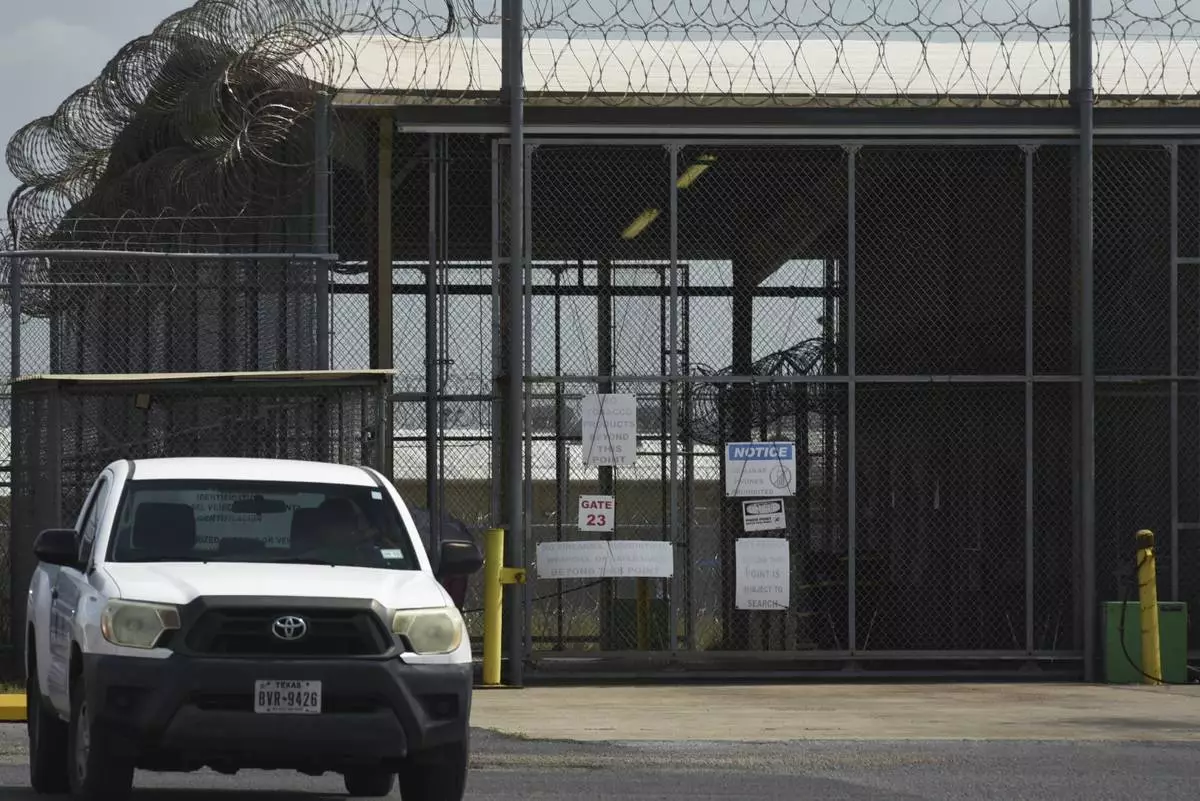
The El Valle Detention Center in Raymondville, Texas is pictured, Thursday, May 1, 2025, after a federal judge in the district barred the Trump administration from deporting any Venezuelans at the south Texas detention center under the Alien Enemies Act, an 18th-century wartime law. (AP Photo/Valerie Gonzalez)
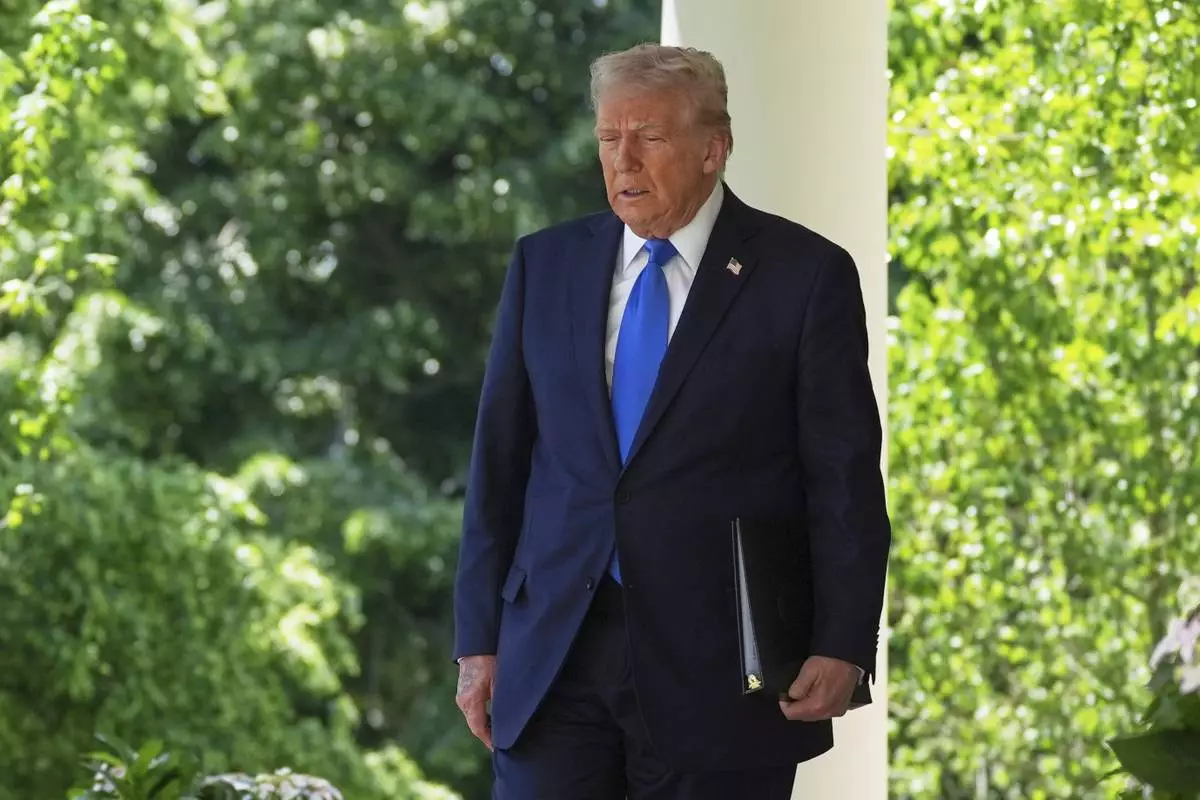
President Donald Trump arrives to speak during a National Day of Prayer event in the Rose Garden of the White House, Thursday, May 1, 2025, in Washington. (AP Photo/Evan Vucci)























































